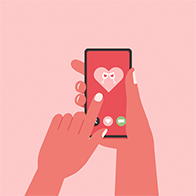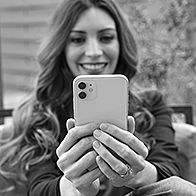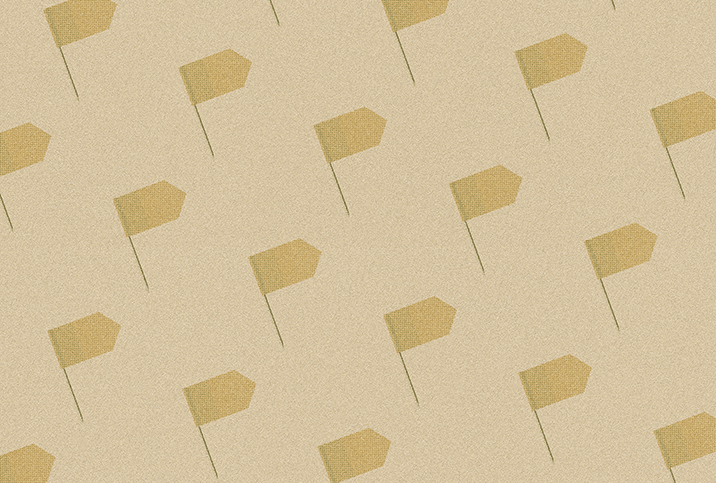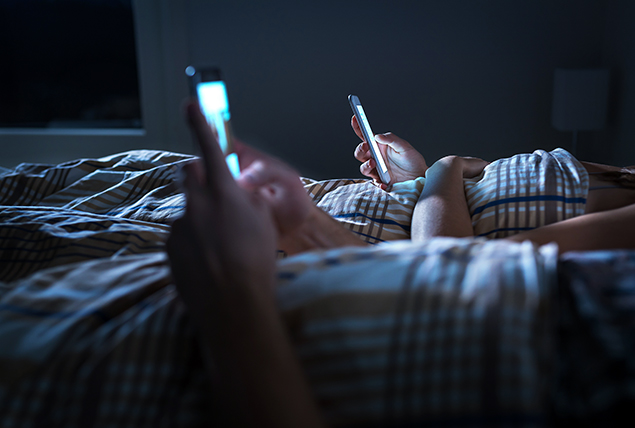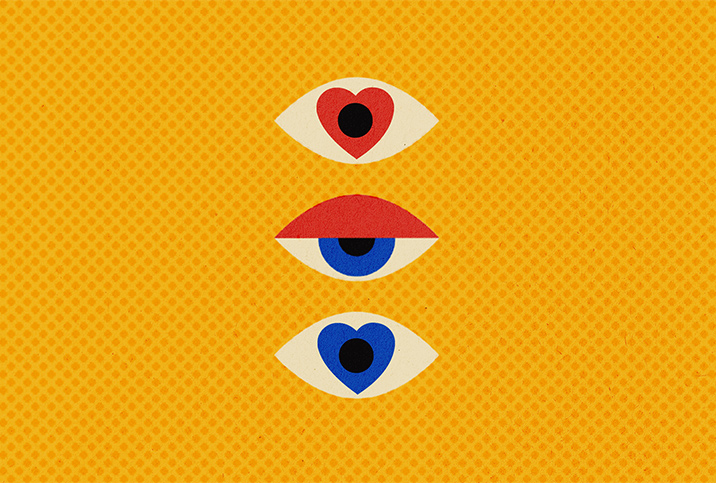Should You Really Be Spilling on Socials About Your Bad Dates?
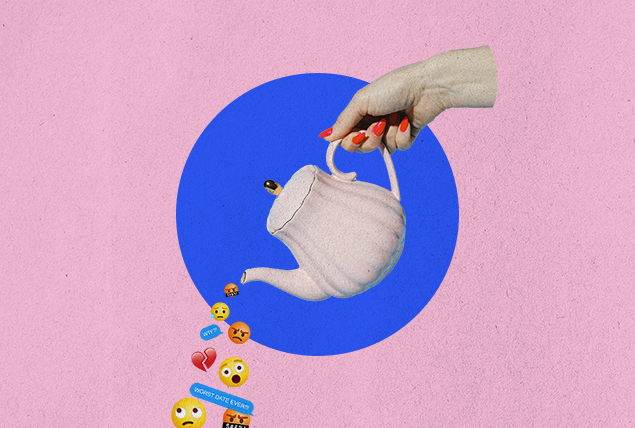
"I just paid the bill and walked out of the restaurant," Dafna Diamant confessed to about 9 million strangers on TikTok. Diamant ditched her Hinge date because he refused to pay $3 extra for cheese on his burger. Her comments debated whether or not this is an actual dating deal-breaker, with some people wondering if she was being "for real," while others failed to understand why she left a guy who "seems really nice" and was "not a catfish" over a $3 slice of cheese.
Turns out Diamant, of New York City, wasn't being "for real" because this date never actually happened. At least, not to her. Diamant overheard this conversation while on a promising date of her own. So why did she feel the need to spill the tea on what she assumed was a dating disaster for someone else, instead of talking about the good date she was actually on?
Diamant didn't exactly reinvent the wheel here, as TikTok is flooded with hundreds of thousands of videos similar to this one, with the hashtag "DatingTok" garnering 589.8 million views, as of writing this article.
Are you dating for love or views?
Why do people feel the need to share the most intimate and cringeworthy details of their dating lives with strangers on social media? And how does posting about your dating life affect your own chances of finding a genuine connection?
"I think it's an outlet for some people and a place where they can release whatever emotions they may be feeling about their bad dates or previous relationships," said Jacqueline Fae, a relationship expert and the CEO and founder of IDL Match Club, an exclusive personal matchmaker site based in South Florida. "By posting online, they are able to get that negativity out of their system while also finding people that may relate to their situation."
This is true for Mystkue Woods, of Philadelphia, who started spilling about her bad dates and even her "sexy time" experiences on live Instagram posts. Woods said she enjoys being able to help others who might be struggling through similar experiences. She found sharing her dating journey helped her stay away from the wrong situations and understand why she tends to attract people who are "emotionally unavailable or have chaos surrounding them," which she cited as a reason she's been single for the past six years.
To post or not to post
Woods' Instagram lives aren't always negative. As an "avid lover," she also highlights her victories, but she realizes sharing her dating life might be impacting her chances of finding a genuine connection.
"Oftentimes, people think I am using them as research, but that is not the case [because] I strive to show up as my authentic self," said Woods, M.Ed., a sexuality arts educator and the CEO of Mystkue Publications.
"The problem with people spilling their bad dates on social media is that you are airing out dirty laundry that doesn't need to be aired," Fae warned. "It can backfire because it can be hurtful to the person you're talking about, whether it's someone you went on one date with or an ex."
Legally speaking, you could also run into some issues, but if your bad dates are not texting back, they probably won't sue. Probably.
"You're giving away personal information that you had in an intimate, private relationship," Fae said. "It's an invasion of privacy for the other person when you spill all of the nitty-gritty details to the world. When you do this, it can make you look bad and turn potential partners away out of fear that they might be talked about online as well."
Maybe it's a means of catharsis
Diamant's "cheese-gate" confession is hands down the most-watched video on her TikTok page, with 8.6 million views and counting, whereas her other content typically plateaus at a couple of thousand views.
"When people share these stories online, it can often be comedic," Fae said. "Sure, maybe it's a way to get attention, but isn't everything we post online?"
Linda Bailey Walsh began opening up about her bad dates on her Los Angeles-based live show and podcast "Hatedate" after becoming single following a long-term relationship and being "shocked" at the things being said to her on dating apps.
"Spilling the tea about my bad dates was extremely cathartic," said Bailey Walsh, an actor, writer and comedian. "Dating can make you feel confused and out of control. You don't even know these people and suddenly you find yourself worrying about what they think of you. Talking about my experiences definitely helped me regain my power."
Publicly reflecting on her dating life helped Bailey Walsh "spot red flags from a mile away" and discover her own dating patterns, which in turn helped her make more informed dating decisions. On the other hand, she began to second-guess her motives.
"Unfortunately, it got to a point where I found myself almost hoping a date would go wrong. Everything is fodder, right?" Bailey Walsh said. "More often than not, I would find myself on dates and when something possibly not great happened I'd start thinking, 'Oh, boy, here we go. This is going to be a story.' I'm sure it wasn't always fair to the dates."
Venting can help you discover what you want
Before TikTok, I posted my own dating disasters on my Instagram story in a series called "Daily Date," so I totally understand the urge to spill about these failures on socials and how validating it is for people to sympathize with and relate to your struggles.
At first, I did it to hold myself accountable to actually go on dates after breaking up with the boyfriend I thought I was going to marry. Then it became a game I played with myself: If the date sucked, I could post about it because I had nothing to lose. If the date was promising, well that was a win in itself. I'd keep this potential love interest to myself until he inevitably ghosted or gave me "the ick," both of which kept happening since I was swiping in Los Angeles.
Eventually, my "Daily Date" videos helped me realize what I was looking for: someone promising enough not to post about. A few months later, I went on my first date with my now-husband, who I would've never met if I didn't hold myself accountable going on all those dates. He didn't show up in my Instagram stories until I soft-launched him on Halloween wearing a "Scream" mask to my Casey Becker.
Bailey Walsh also gained dating clarity after starting her podcast.
"Having enough crummy dating experiences makes it very clear what you don't want, and once you learn that, it is so much easier to narrow your search and find what it is that you do want," she explained. "Just be clear about what it is that you want with yourself and others, and things will go much more smoothly. I did not know what I was looking for when I first became single, and because of that, I found myself in a lot of situations that weren't right for me."
Sharing vs. oversharing
If you're posting about bad dates, you might find—in the same way that Bailey Walsh, Woods and myself eventually discovered—it's ultimately going to hurt your dating life.
"If you're posting negative, personal details about past relationships, potential partners will be hesitant to pursue you," Fae said. "If you're posting something that's lighthearted and comedic, that is completely fine. It's a fun way to show you're single."
"The main difference between sharing and oversharing [your] dating life on social media is finding the right balance," explained Laura Wasser, a family law expert in Los Angeles and chief of divorce evolution at Divorce.com. "If you're constantly posting about how terrible all your dates are or badmouthing your exes, it can start to look like you have a negative attitude toward dating and relationships. So possible partners would start thinking that it is impossible to build healthy relationships with you and they could become new heroes of your new story on social media after they agree to hang out."
If you feel posting about your dating life on social media might be preventing you from having a genuine connection, there are some steps you can take to change.
"I recommend sharing stories about the good dates you've had as well or explaining to others what you're looking for in a partner," Wasser said. "You can even ask your followers for advice on how to navigate the dating scene. The key is to show that you're open to finding something real and not just using social media as a platform to vent about your bad experiences. By being positive and proactive, you'll attract like-minded people who are also looking for genuine connections."
Sharing your positive dating experiences might not get you millions of views, but it could lead to a one-in-a-million connection.







